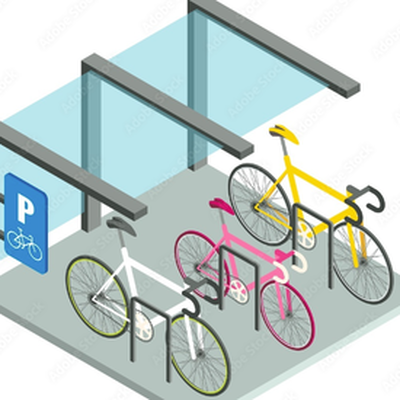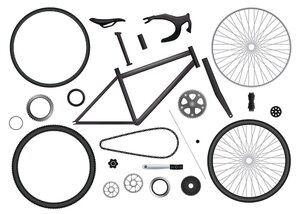Cuerpo
Mountain biking has captivated the hearts of adventure enthusiasts all around the world with its heart-pounding trails and challenging landscape. But in the middle of the exhilarating journey, there are a lot of falsehoods and realities about mountain bikes South Africa. We explore the facts and dispel the myths behind these recognizable off-road vehicles in this extensive guide.
Myth: Mountain Bikes Are Only for Mountains
Fact: Although they work best on rugged terrain and steep inclines, mountain bikes aren't just found in hilly areas. Thanks to their adaptability, riders can navigate a wide range of terrain, including urban parks, gravel walks, desert dunes, and forest routes. Mountain bikes are an excellent option for riders of all skill levels due to their sturdy build and nimble handling, whether they are riding rugged trails or commuting to work.
Myth: All Mountain Bikes Are Created Equal
Fact: Not every mountain bike is made of the same materials. Mountain bikes are available in an extensive range of sizes and forms, each suited to particular riding styles and riding conditions, from cross-country competitors to downhill aces. A bike's performance and handling qualities can be greatly influenced by elements, including the type of frame, the suspension system, and the size of the wheels. It's important to comprehend these subtleties while choosing the ideal bike for your riding style and ability level.
Myth: Full Suspension Is Always Better Than Hardtail
Fact: Mountain bike fans continue to argue passionately between full suspension (dual suspension) and hardtail (front suspension only) models. Hardtails are frequently lighter, more capable climbers, and require less maintenance than full suspension bikes, which provide superior comfort and control on tough terrain. Which option is best for you depends on your riding style, riding preferences, and the kinds of trails you ride. Each has advantages and disadvantages, and neither is better than the other on an intrinsic level.
Myth: Fat Bikes Are Only for Snow and Sand
Fact: With their large tires and robust frames, fat bikes have become more and more popular since they can easily navigate sandy beaches and snow-covered slopes. But they can do much more than just ride in the winter and along the seaside. Because of their enhanced traction and stability, fat bikes perform exceptionally well in muddy situations, loose gravel, and tricky terrain. A fat bike's float and grip make it an excellent partner in every season, whether you're cruising through challenging single tracks or exploring remote wilderness.
Myth: Mountain Biking Is a Male-Dominated Sport
Fact: Although there has always been a male preponderance in the mountain bike scene, things are rapidly changing. The number of women riding mountain bikes is increasing, and around the world, events, equipment, and advocacy groups catering to women's needs are becoming more popular. More women are taking up the sport thanks to initiatives that tear down barriers and support inclusivity and diversity. Everyone may enjoy mountain biking, regardless of gender, age, or background, as seen by the increasing number of female riders.
Myth: You Need Expensive Gear to Get Started
Fact: Despite what many people think, you don't have to spend a fortune to enjoy mountain biking. Entry-level bikes and equipment offer great value for novice and recreational riders, while high-end models offer state-of-the-art technology and performance features. The availability of reasonably priced mountain bikes South Africa, protective clothing, and accessories makes it possible for beginners to try out the activity without breaking the bank. So you can easily buy mountain bikes and other accessories on a budget. As your mountain bike abilities and enthusiasm increase, you can progressively modify your equipment to meet your changing requirements and tastes.
Myth: Mountain Biking Is Extremely Dangerous
Fact: Although there are risks associated with mountain biking, nothing more so than other adventure sports or leisure pursuits. Riders can reduce their risk of accidents and injuries on the trail by taking the necessary safety precautions, developing their skills, and receiving the correct training. Wearing the proper safety equipment, such as gloves, knee pads, and helmets, can reduce the effect of falls and collisions and increase peace of mind. A safer and more pleasurable riding experience is enhanced for all riders by following trail etiquette, riding within your skill level, and understanding your boundaries.
Myth: Mountain Biking Is Harmful to the Environment
Fact: It is not necessary to choose between environmental preservation and mountain biking. Although riding trails can hurt natural ecosystems, environmental harm can be reduced through sustainable trail management and responsible riding behaviors. Trail stewardship organizations put out great effort to protect and preserve off-road networks, making sure that there is as little disturbance as possible to ecosystems and wildlife habitats. MTBers may reduce their environmental impact and support the long-term health of natural environments by adhering to the Leave No Trace philosophy, honoring trail closures, and helping out with trail maintenance.
Myth: Mountain Biking Is an Individual Sport
Fact: Mountain biking is a social sport that promotes community and friendship while simultaneously providing freedom and seclusion on the path. Mountain bike organizations, planned events, and group rides give riders the chance to meet new people who share their interests, exchange stories, and gain knowledge from one another. The sense of support and camaraderie among mountain bikers is unmatched, whether you're taking on big trips with fellow riders or taking on technical descents with pals.
Myth: You Have to Be an Expert Rider to Enjoy Mountain Biking
Fact:
Riders of all ability levels, from complete beginners to seasoned pros, can enjoy mountain biking. Anyone may become a proficient and safe trail rider with the right guidance, training, and dedication. As your skills develop, work your way up to more difficult terrain by starting with beginner-friendly paths. Every mountain bike trip presents a chance for personal development, discovery, and adventure. It's not just about the destination.









Comentarios